| Marie de Vaublanc had just attained the age of seventeen, till which period sorrow had never obtruded itself on her youthful mind; she knew not, and therefore did not fear, the unsteadiness of Fortune. Alas! To the eye, accustomed only to a continued sunshine, how fearful must be a lowering sky!... --opening of First Impressions |
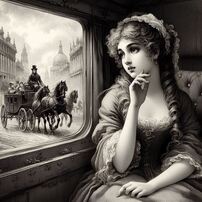 Hapless heroine thrown upon the world. AI generated image.
Hapless heroine thrown upon the world. AI generated image. Holford's First Impressions is a four volume novel, and although the action drags a bit in the middle as we suffer along with the heroine through her various vicissitudes, I have to say it starts out with a bang--Holford wastes no time in setting up her heroine to be both penniless and friendless. Her plight is not a very good reflection on the foresight of her late guardian, Madame de Vaublanc, when it comes to estate planning. We have to assume that good old lady didn’t realize her cousin and executor was dishonest and corrupt, although the fact that his name is “Gripe” should have tipped off any cautious woman...
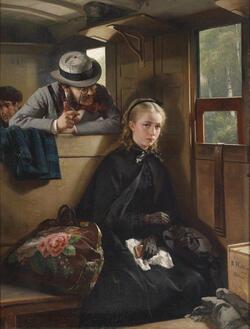 Harassed wherever she goes: The Irritating Gentleman, Woltze
Harassed wherever she goes: The Irritating Gentleman, Woltze It is “brutally revealed” to Marie by this lawyer/cousin that she is not a de Vaublanc. They rename her "Maria Clive." No-one knows who her parents are, and the Gripes are not obliged to help her. Mrs. Gripe gives Sense and Sensibility's Fanny Dashwood a run for her money--Marie will be permitted to keep only the clothes on her back.
Maria is told she's been given a job as a governess. She is packed off to a distant English country house but when she arrives there, after travelling unescorted by mail coach, she discovers it’s the home of Sir Edwin, a roguish baronet. The woman from the employment agency was actually a panderer, and Maria—an extremely beautiful girl—has been sent there for the rake's approval.
Luckily for Maria, Sir Edwin is away from home, which gives her time to win over the old housekeeper and convince her that she is not a shameless floozy but a genuine virginal innocent. The neighborhood, however, assumes differently—otherwise why would she be there? No smoke without fire, you know. In addition, Maria's unknown parentage means she might be illegitimate. This, plus her poverty, make her ineligible for a good marriage and highly eligible to be propositioned wherever she goes. Remember how Mr. Knightley in Emma talks about how Harriet Smith will be "retired enough for safety... never led into temptation, nor left for it to find her out." That's what he's talking about.
When Sir Edwin does come home, he is enchanted with Maria and offers her a fortune if she'll be his mistress. She eloquently and vigorously refuses--he is surprised at her, and ashamed of himself. We learn that Sir Edwin, in an act of careless bravado, recently vowed he would marry the first truly chaste and virtuous woman he met, since he believed no such woman could exist. But here she is, a transcendently beautiful girl warbling a Rossini aria at an ivy-covered window. Maria’s vocabulary and formal way of speaking makes it clear that she is genteel, intelligent and well-educated, and whatever her current position in life, she came from better things.
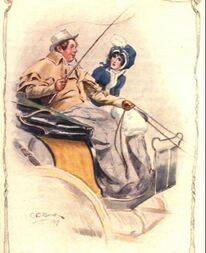 Northanger Abbey's John Thorpe
Northanger Abbey's John Thorpe Sir Edwin sends Maria to live with his married sister Mrs. Brudenell to acquire some more social polish, without telling Maria he plans to marry her. He goes abroad to Europe in the meanwhile, and the hero and heroine are separated and out of communication with each other for most of the book.
From here, most of the plot is taken up with the perils of being so beautiful that you can't step outside without being accosted or propositioned. For example, while Maria is walking quietly in her mourning clothes, a young man lazily strolls by and “one glance from her bright eyes roused him from his lethargy, like an electrical shock, and extorted from him two whole ejaculations, and half as many interrogatories.”
Mrs. Brudenell--deceitful, cruel, and sarcastic--is the most interesting and vivid character in the book. She’s horrified that her brother is thinking of marrying some unknown chit on a crazy whim, and she plots to get Maria married off to somebody else before her brother returns. She lights on a family relation, Samuel Dibbins, an oafish John Thorpe type, and even arranges for Samuel to take Maria for a day trip to see some ruins with the real intent of carrying her off to Gretna Green, but the plan fails.
To Mrs. Brudenell’s disgust, the most eligible bachelor in the neighborhood also falls for Maria. But Maria won’t have him either, for she won’t give her hand without her heart. Maria (alas!) is carrying a torch for Sir Edwin, even though she knows he’s a rake.
To make matters worse, Maria learns that Mr. Brudenell is plotting to have his wicked way with her. First, he tried the old Godwinian free love arguments on her: “Yet, with a mind enlightened, and soaring above the common race of mankind, can I suppose you shackled by the false prejudices of Churchmen and fanatics"? Since that failed, he will surely resort to force. She flees in the dead of night.
| Accident-prone heroine Volume III brings another series of adventures: Maria helps a wounded woman lying in the road, then is falsely accused of theft. That's followed by an attempted abduction and a carriage accident. She is briefly taken in by a genteel family and she engages in some private theatricals, where, coincidentally, she bumps into Sir Edwin again. She flees. Suffice it to say that no matter what she does, Maria can’t catch a break. Although she is now wan and pale and thin, her beauty is still so amazing that she must continue to fob off insulting propositions. Reduced to working as a milliner’s assistant, she begs to excused from waiting on the customers, and who can blame her? But worse luck, she's asked to deliver a parcel and she runs into some old enemies... |
After the ceremony, but before they even cut the bride cake, a long-lost relative shows up with the amazing revelation of our heroine’s true noble and legitimate parentage. She is worthy of being a Countess! And she will live happily ever after. The heroine has proved she has married Sir Edwin for disinterested motives, and he has proved that he loves her for herself, not because of her family tree.
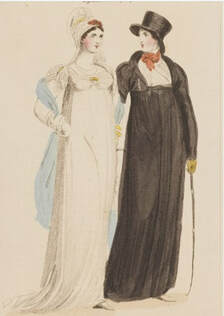 Miss Dashwood takes great interest in Maria. (Lady's Magazine fashion print, National Portrait Gallery)
Miss Dashwood takes great interest in Maria. (Lady's Magazine fashion print, National Portrait Gallery) - Mrs. Brudenell gets sarcastic with Maria when she is at her most butter-wouldn't-melt-in-her-mouth heroine-like. It seems like a way of having your virtuous heroine and making fun of the tropes at the same time. The author can wink at the audience or express her own impatience with the picture of perfection heroine. I also noticed this in the novel Clarentine.
- Touches of feminism: Maria has dignity and stands up for herself; it just happens to be in the context of never-ending threats to her virgin purity, but there is still something proto-feminist in the way she sets a value upon herself. She cries, with good reason, but hardly ever faints. Before her marriage, she remarks to her fiancé: “it will so soon to become my duty to consider your Lordship’s entreaties as commands, that it may be well, perhaps, to make a merit of obedience while I can.” “As for commands and obedience,” said he, “I abjure the words. No, no, pride and delight of my heart! where love is mutual, mutual also must be the wish to please.”
- Holford includes an Amazon character, Miss Dashwood, who lives for the hunt but who also takes (ahem) quite an interest in our heroine. Nothing comes of it, however and by the end of the novel Miss Dashwood and other secondary characters are all paired off and married.
- The author does a good job of linking her large cast of characters together and resolving all the plotlines. Most of her characters have some role to play in the plot, and are not just there to serve as warnings or comic stereotypes.
More about the emphasis on female chastity here. And if you want even more, there's this novel and this novel and this novel..
Previous post: Charlotte, the uber heroine Next post: Margiana and Susan |
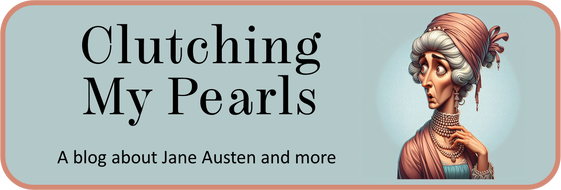
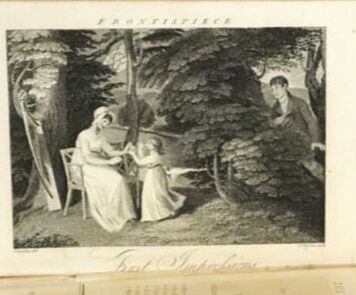
 RSS Feed
RSS Feed